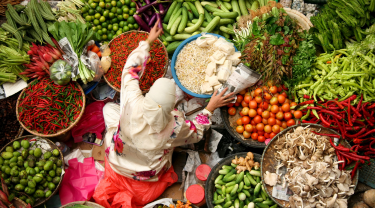
Indo-Pacific Agri-Food Office opens more opportunities for exporters
Author details
Roberto Bagnato
Former Marketing business partner, Indo-Pacific strategy
In this article:
- Help from on-the-ground experts
- Long-standing trade relationship
- Surging agri-food demand in ASEAN markets
- The Philippines: A strategic choice
- Diverse opportunities for Canadian exporters
- Let’s talk challenges—and how the new office can help
- Export Development Canada: Ready to support your export journey
Burgeoning economies and a growing middle class are firing up appetites for a sustainable supply of high-quality, healthy foods in the Indo-Pacific. Recognizing the enormous opportunities for Canadian agri-food exporters looking to increase their global footprint, Canada recently opened its first Indo-Pacific Agriculture and Agri-Food Office in the Philippines.
“The Indo-Pacific region represents a massive opportunity for Canadian exporters,” says Jay Albers, Export Development Canada’s (EDC) Indo-Pacific Agri-Food Global Trade director. “Countries, like Vietnam, Indonesia and the Philippines, are experiencing rapid growth, particularly in their middle-class populations, which is driving demand for premium agricultural and value-added food products.”
Help from on-the-ground experts
Supported by EDC, the office opening in Manila signifies a strategic move to deepen trade relations and expand Canada’s reach in the Indo-Pacific, which is comprised of 40 countries, including India, Australia, Korea, Vietnam and Japan. Diedrah Kelly, executive director of the new office, says it will help Canadian food producers and processors advance their business goals in the region by providing on-the-ground market intelligence, industry connections and regulatory support.
“The office has representatives from Agriculture and Agri-Food Canada, as well as the Canadian Food Inspection Agency, to ensure seamless agriculture sector government representation in the region,” she explains. “We’re in the Philippines to build critical regulatory and market relationships and have those important conversations with our counterparts in the region.”

Long-standing trade relationships
Canadian exporters to the Indo-Pacific region won’t be starting from scratch. Canada already has well-established trade relationships with many countries in this part of the world, thanks to trade agreements such as the Comprehensive and Progressive Agreement for Trans-Pacific Partnership and the Canada-Korea Free Trade Agreement. These economic pacts have succeeded in boosting Canada’s exports to the Indo-Pacific across a wide range of sectors.
The Canadian agriculture and agri-food sector, for one, exported $22.5-billions’ worth of commodities and value-added products to the region in 2023, representing one-quarter of Canada’s total agriculture and agri-food sales around the world in the same year. Yet, the country’s market share remains relatively small in the Indo-Pacific, offering considerable room for growth.
“The Indo-Pacific is a net importer of food and agricultural products, despite its own agricultural strengths,” says Albers, adding, “Canada has the opportunity to fill gaps in supply.”
You should also check out
Build your strategic knowledge, navigate cultural nuances, and expand to this dynamic region with confidence.
Surging agri-food demand in ASEAN markets
The opportunity is particularly strong among member countries of the Association of Southeast Asian Nations (ASEAN), where imports increased by 177% between 2012 and 2022. This surge in demand is driven by rising incomes, a growing middle class and increasing urbanization—factors that have led to changes in consumption patterns and a greater appetite for higher-quality and more diverse food products.
“With higher disposable incomes, consumers in Southeast Asian countries are spending more and more money on proteins, fruits and healthy foods,” says Peter Ng, EDC's Singapore-based Global Trade director for the Indo-Pacific. “They’re also seeking more high-quality processed foods.”
Consumers in the region are also increasingly shopping at online grocery stores, presenting potential opportunities for Canadian exporters who can offer products that stand out in this competitive channel.
The Philippines: A strategic choice
Choosing the Philippines as the site for Canada’s new Indo-Pacific office makes strategic sense, says Ng. Regulatory reforms, in recent years, have lowered barriers to entry for foreign-owned companies, and the prevalent use of English—the official business language and second national language of the Philippines—makes it even easier to do business in the country.
“The Philippines is a natural gateway to the broader ASEAN region,” says Ng. “Its business-friendly environment and linguistic and cultural affinity with the West make it an ideal location for Canadian exporters to base their operations.”
This country of 113 million people—the second largest ASEAN market based on population—has also become a critical destination for Canadian agri-food exporters, says Kelly. In recent years, the country has become increasingly reliant on imported food products such as wheat and pork, largely due to its growing population, rising middle class and changing consumer tastes.
“The Philippines not only serves as a gateway for Canadian businesses looking to expand throughout the Indo-Pacific region but is also a growing market in its own right,” says Kelly.

Diverse opportunities for Canadian exporters
Beyond the Philippines and ASEAN markets, the Indo-Pacific offers Canadian exporters opportunities across a diverse range of agri-food products:
- Wheat: Wheat is one of the most in-demand products in the Indo-Pacific region. Countries, like Indonesia, the Philippines and Vietnam, import large quantities of wheat to support their growing bakery industries. According to Albers, Canada currently holds a modest share of the region’s wheat market, with significant potential to increase exports.
“The Philippines alone imports more than $3 billion worth of wheat annually, yet Canada currently captures only 1.7% of that market,” he says. “With a strong reputation for quality, Canadian wheat producers have ample room to expand their presence in the region.”
- Pork: The demand for pork is rising across the Indo-Pacific, particularly in countries, like the Philippines and Vietnam, where rising incomes are driving the shift towards more protein-rich diets and increased pork consumption. In the Philippines, local pork production has been severely impacted by African Swine Fever (ASF), leading to an increased reliance on imports.
“Canada has stepped in as a key supplier of pork to the Philippines and we expect this demand to continue as the region recovers from ASF,” says Kelly.
- Seafood: Indo-Pacific countries represent some of the world’s largest seafood markets. While the region has a strong domestic seafood industry, there’s growing demand for premium seafood products such as salmon, lobster and crab.
“Canadian seafood, especially from our Atlantic provinces, is highly sought after in countries, like Vietnam and Singapore,” says Ng. “Canadian seafood exporters have significant opportunities to expand in these markets.”
- Processed foods: As urbanization accelerates across the Indo-Pacific region, there’s increasing demand for processed foods. Consumers in countries, including Indonesia, Malaysia and the Philippines, are increasingly seeking out premium options for value-added foods such as confectionary products, says Ng.
- Malt: The Indo-Pacific’s brewing industry is also expanding, boosted by the success of major breweries such as San Miguel in the Philippines and Asia Brewery in Vietnam. This offers Canadian barley producers an opportunity to increase their malt exports.
- Plant-based proteins: The growing interest in plant-based proteins provides opportunities for Canadian producers of pulse crops such as peas and lentils to meet the region’s demand for alternative protein sources.
- Pet food: The pet care market in the region is booming, with more households treating their pets as family members. This has led to a rise in demand for high-quality pet food, creating a niche market for Canadian exporters. As Kelly points out, “There are significant opportunities for Canadian pet food companies to enter this growing market, particularly with premium, health-focused products.”
- Halal foods: As home to a large percentage of the global Muslim population, the Indo-Pacific region is the world’s biggest market for halal food. This market has grown in recent years as disposable incomes have risen in many Muslim countries. At the same time, evolving tastes among younger Muslim consumers have driven demand for non-alcoholic beverages, halal plant-based proteins and healthy items such as superfoods and keto products.
- Organic food: Consumers in the region—particularly in South Korea, Japan and Taiwan—are looking to add more organic foods to their diet. To ease the way for Canadian exporters, regulators in these countries have signed organic equivalency arrangements designed to ensure acceptance of organic products certified in Canada.
You should also check out
From in-market expertise to financing, find the right government services for your business.
Let’s talk challenges—and how the new office can help
While the Indo-Pacific presents many opportunities for Canadian exporters, it also comes with challenges. One of the primary hurdles is the logistical complexity of shipping goods from Canada to Southeast Asia. Ng also points to higher freight costs—which can be reduced with the right strategies—and longer shipping times, compared to competitors such as Australia.
Another challenge is navigating the region’s complex regulatory environment. Each country in the Indo-Pacific has its own import requirements, and ensuring compliance can be a time-consuming process. This is where the Indo-Pacific Agriculture and Agri-Food Office can help.
“Our office offers on-the-ground assistance to Canadian exporters, helping them navigate regulatory challenges and overcome trade barriers,” says Kelly. “With the support of EDC, AAFC, and the Indo-Pacific Agriculture and Agri-Food Office, Canadian companies can overcome challenges, build relationships and capitalize on the significant opportunities the Indo-Pacific region has to offer,” she says.
Export Development Canada: Ready to support your export journey
EDC is part of the Government of Canada’s trade ecosystem of experts available to help you save time, learn more about your target markets and identify the capital you need to grow. As part of our Indo-Pacific strategy, EDC is committed to helping Canadian companies diversify into new markets and succeed in this dynamic region.
We also offer market intelligence and connect Canadian exporters with local buyers and distributors. This comprehensive support helps businesses not only enter the Indo-Pacific market, but also thrive long term.
In addition, EDC offers:
- A full suite of credit insurance products to lower your risk for doing business abroad
- Help with getting access to working capital
- Expertise to enable you to learn more about international markets
- Connections to international companies in need of your products and services
Learn more about how EDC’s financial and knowledge solutions can help you understand the opportunities in your target market and make exporting less risky.
To contact an EDC export advisor, visit our Export Help Hub.

















